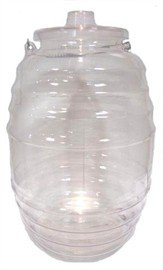brewsbrothers
Well-Known Member
I would like to hear everyones opinions and ideas about fermenting (beer, cider, mead anything) in 5 gallon water cooler water jugs?

So, is it an absolute "bugaboo" to use a #7 plastic water jug as a secondary fermenter? Will I die/get/cancer/(most importantly) have beer that tastes like doo-doo if I use it instead of glass or a fermentation-specific vessel? I picked this particular vessel (#7 5 gallon plastic water jug) from a local water distributor for $7, and would like to use it if I could, but if it's seriously a health hazard then I will pass. But if it's just something that's "frowned upon" or not recommended, I would like to use it for fermentation instead of auditioning for the broadway production "Stomp."

You make an interesting point about cleaning. This is actually one of the reasons that I liked this jug.....I use 4gal PET bottles from Menards (3gal batch). No worries at all with them, and they're recyclable so no deposit charge.
Pro - cheap, PET, takes a #10.5 stopper for the airlock, water inside's not bad either, when they get funky just recycle them, center is raised leaving pockets at the bottom for yeast/trub (makes racking easy)
Con - thin (so be careful of suckback/moving), ridges make thorough cleaning a pain, odd size (not thin/tall, but fat/short)
I like them, but I make a point to only get PET (#1) bottles to ferment in.
The opening in my container is 5.5" wide. I can't seem to find a stopper that big.... Any suggestions?
if it has a lid drill a hole for whatever size stopper you want to use
Enter your email address to join: